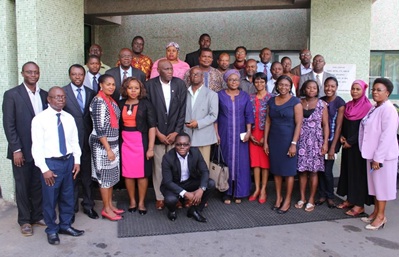
Nigerians are patiently waiting to start reaping the benefits of modern biotechnology now that the longstanding Biosafety Bill has finally become an Act. Etta Michael Bisong observed how important the new Biosafety Law is to Nigeria’s economy.
Modern biotechnology and its introduction into biodiversity have frequently raised public attention on environmental as well as health protection. Most of these anxieties although not backed by science have formed the basis for most perception about the application of this technology into human affairs.
Nigeria, like other countries endowed with huge natural resources understands this fundamental problem as key to the successful domestication of biotechnology activities in the country.
The adoption of agreements such as the Cartagena Protocol further reveals this understanding. Nigeria accords high priority to the successful implementation of this Protocol on Biosafety and all UN resolutions and has participated in all the meetings of the Conference of Parties to the Convention on Biological Diversity Serving as meeting of Parties to the Cartagena Protocol on Biosafety (COP-MOP).
This commitment is also reflected in her efforts in the domestication of the protocol and the mainstreaming of biosafety into her National Programs with the aim of achieving global biodiversity conservation targets.
Nigeria has equally been active in the Biosafety Clearing House (BCH) as a means of information exchange on Biosafety issues. The nation has equally signed the Nagoya Kuala Lumpur Supplementary protocol on Liability and Redress to the Cartagena Protocol on Biosafety in 2012.
In the sub-region of West Africa, Nigeria is one of those countries yearning for common ECOWAS Biosafety Regulation, which is being developed. In the African region, Nigeria has also participated in Biosafety initiatives and programs that promote regional biosafety.
Nigeria being a signatory to the Cartagena Protocol recently passed a law to formalise biotechnology activities in the country. The law although is coming much later than anticipated, many experts as well as stakeholders have lauded its passage as the vibe for economic transformation in Nigeria.
Presently, the Federal Ministry of Environment is the National Focal Point and the Competent National Authority (CNA) on Biosafety in Nigeria. As the nation’s CNA, the Biosafety Unit under the supervision of the ministry is mandated to superintend over the safe management of modern biotechnology activities, including research, development, introduction and the use of the products of modern biotechnology–genetically modified organisms (GMOs). It carries out such other duties as may be necessary for the full discharge of its functions under Biosafety and other related Acts.
One man whose voice has being very vocal on this issue is, Mr. Rufus Ebegba, a Deputy Director and acting head of the Biosafety Unit. Mr. Ebegba while remarking on the passage said the Biosafety Law was signed to provide for the establishment of the National Biosafety Management Agency.
“Now that the President has assented to the bill, the implementing regulations which will develop to pave way for its operationalisation are highly cherished,” he said. “The passing of the bill is a major step towards the safe and responsible use of biotech crops in the country.”
The genetically modified organism’s protagonist explained that Nigeria has adopted modern biotechnology as one of the approaches in the attainment of various sustainable developments in all sectors of the economy particularly in addressing challenges that have been difficult to resolve using conventional approaches.
“It’s on this note that the country has adopted biosafety as a tool for the safe handling, use and transfer of genetically modified organisms by enacting into law, a National Biosafety Act for the establishment of the National Biosafety Management Agency (NBMA). Various Biosafety guidelines and regulations have been drafted. And there exists a Biosafety Unit with well-trained staff ready to kick-start the new Agency,” he said.
Some of the immediate gains Nigerians could derive from the law, according to him includes – capacity for enhanced food security; environmental protection and conservation through production of stress tolerant planting materials for re-vegetation, re-afforestation, soil binding for erosion control as well as genetically enhanced organisms for bioremediation of oil polluted sites.
Others are improvement in plants and animals yields as well as nutritional values, production of new breeds/varieties of animals and plants. Reducing the use of pesticides, farm land area with higher yields, facilitates job and wealth creation, leads to better health facilities, promotion of bioorganic fertilizer development and industrial growth through feedstock development.
Promotion and development of biopharmaceuticals production, stem cell technology, biometrics, and others, in Nigeria and Biodiversity conservation are among the gratifications embedded into the law.
Nigeria is poised to have improved food security, environmental protection and conservation through production of stress-tolerant planting materials for re-vegetation, re-forestation, soil-binding for erosion control as well as genetically enhanced organisms for bio-remediation of oil polluted site. It also seeks improvements in plants and animals yields as well as nutritional values, production of new breeds/varieties of animals and plants, and reduction in the use of pesticides.
Globally, it has long been recognised that bioterrorism and accidental or uncontrolled release of harmful chemicals or genetically modified organisms into the environment are critical issues.
“Consequently, that Nigeria has also deemed it appropriate to finally put in place regulatory framework is a welcome development,” Mr. Ebegba said, adding that, “With proper utilisation of the intent of the Act, Nigeria is set for glory days.”
However, the approval of this law has resurrected many questions such as: how ready is Nigeria to deepen understanding of the experimental risks that come with synthetic biology? How prepared is Nigeria to monitor biosafety standards and strictly enforce the provisions of the Act?
Truth-be-told, the underlying factor responsible for the myth militating against the introduction of GMOs into Nigeria revolves around the gap in public knowledge on the science of modern biotechnology. This is a critical monster the government must contend with since perception influences how people approach real-life situations.
Also, all the institutions whose schedule of duty relates to GMOs by any means should go all out to educate the Nigerian public with the necessary information and understanding of this issue, this is so because in the nearest future, the information will turn out to be the only defensive weapon when unpatriotic elements try to deprive them of the good aspects of GMOs while trying to foist the bad part on them.












